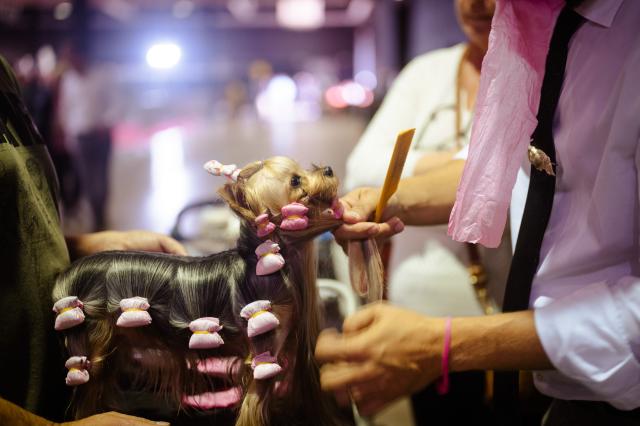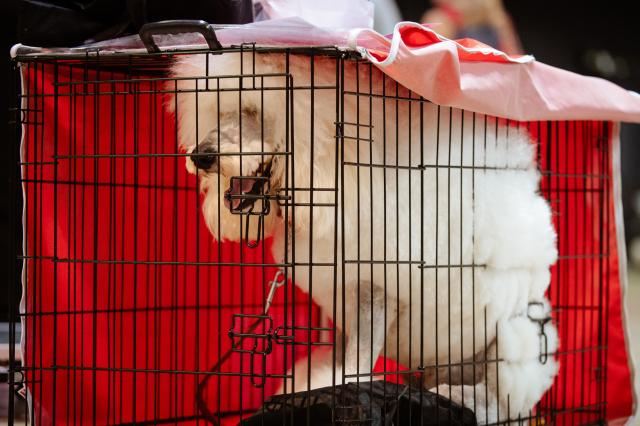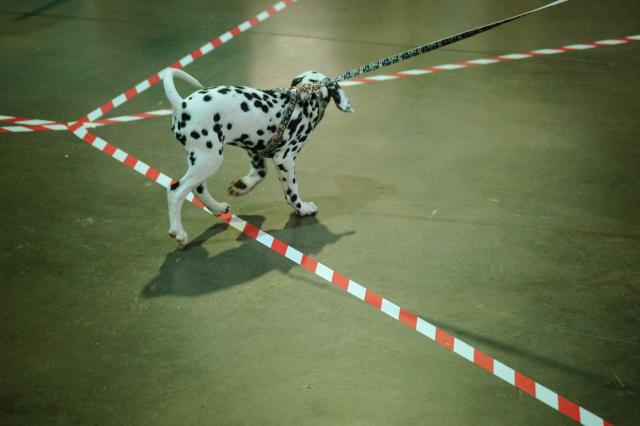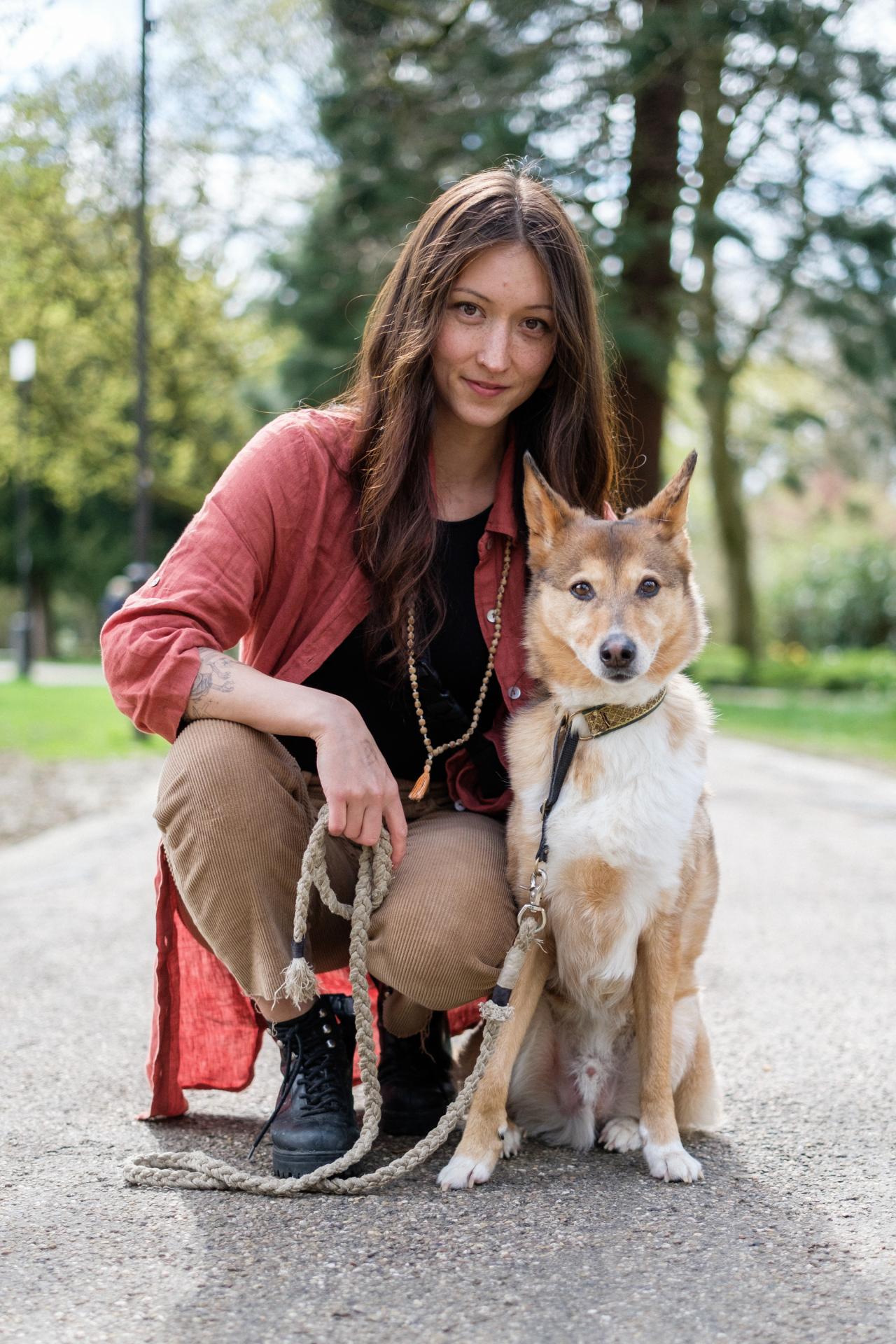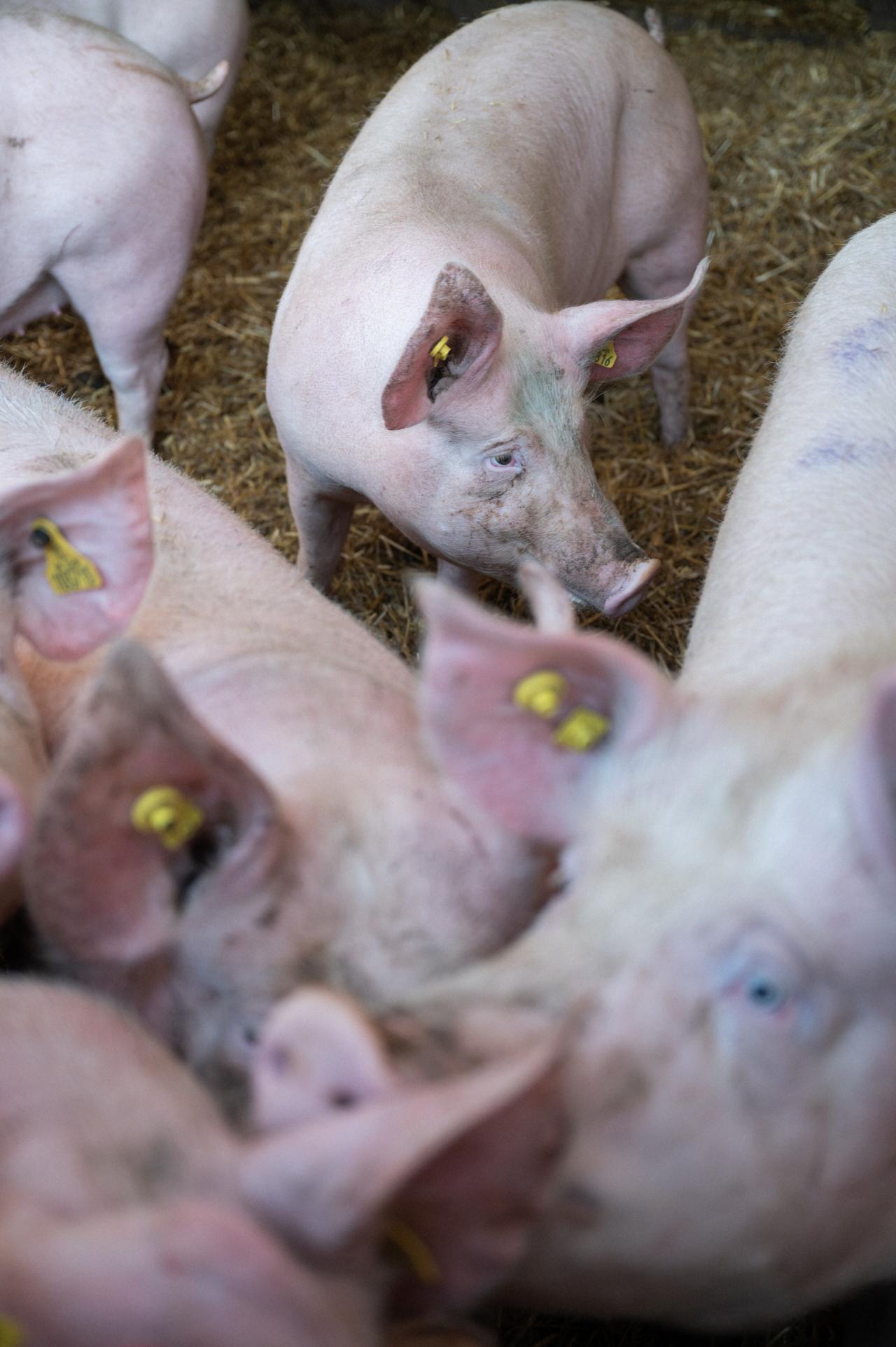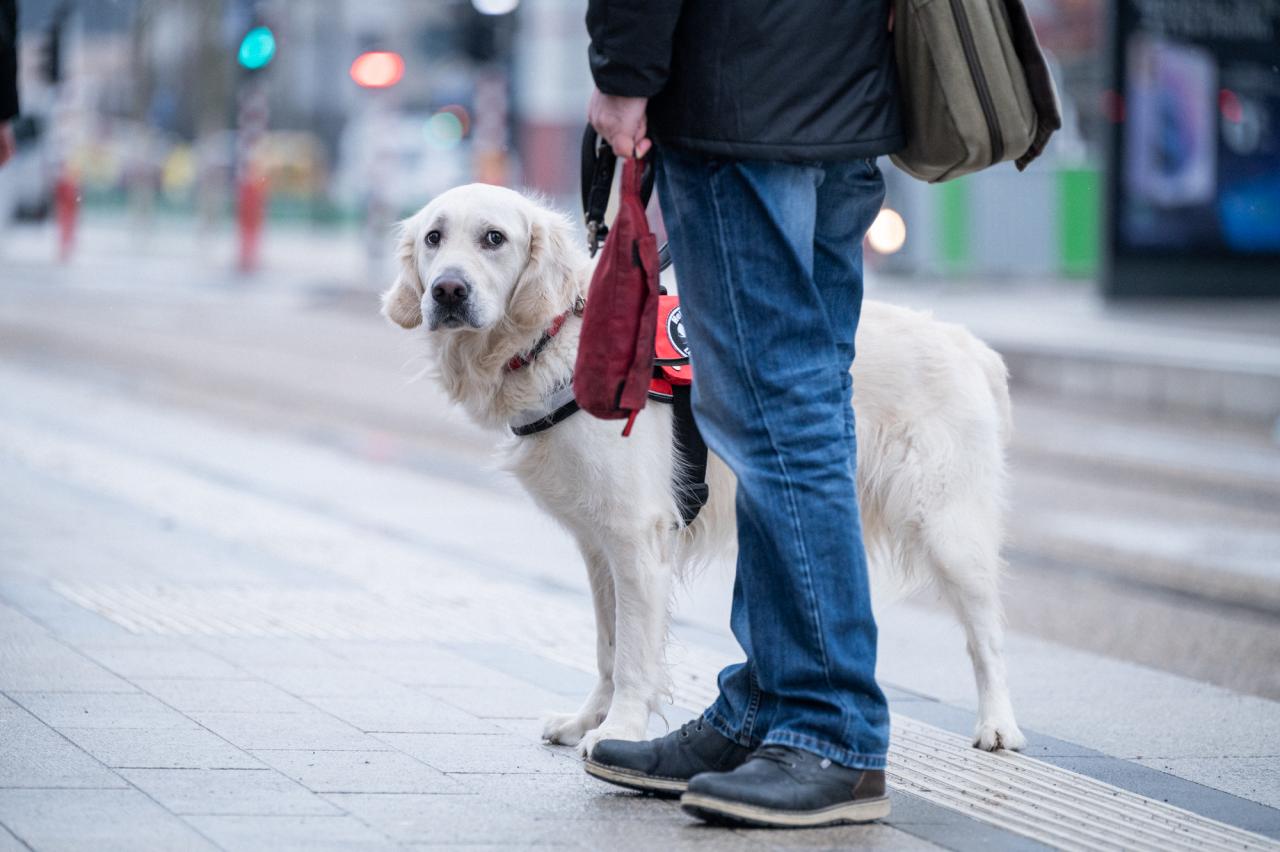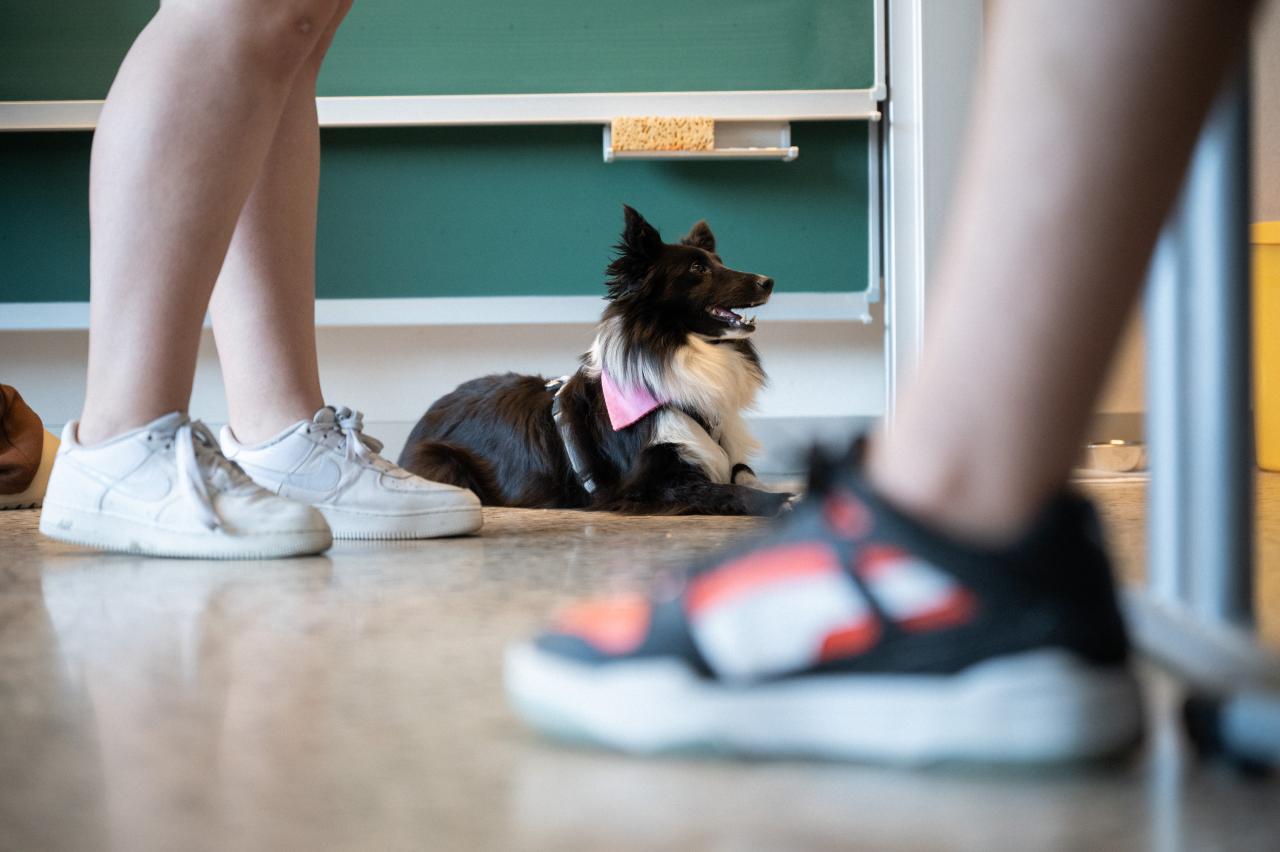Who cares about the animal?
By Lisa Rock, Lex Kleren, Anouk Flesch Switch to German for original article
Listen to this article
The total number of dogs and dog owners has almost doubled in the past five years: more than 82,000 dogs were counted in Luxembourg last year. However, the question of whether the dog should come from breeding or from animal welfare seems to be controversial.
The concreted outdoor area along the east side of the building functions as a dog toilet. We walk past it on our way to the north entrance of Luxexpo and can already catch a glimpse of a few dogs. The smell of urine is definitely present, but bearable. The numerous caravans on the north car park make for an unusual sight as well. Inside, it is darker and louder than expected. The stench of dog fur is in the air, the sound of constant barking echoes in the ears. Several rings have been set up in halls seven to nine. There, individual pedigree dogs are just about to show their best side, while their behaviour and appearance are closely scrutinised by the dog judges.
It is September 3rd, the day when the international Dog Show takes place at Luxexpo in Kirchberg. Around 4,450 dogs belonging to 250 breeds will be shown by exhibitors from 27 countries. Trained judges evaluate the appearance of the dogs according to defined breed standards. The more a dog meets these standards, the better it is judged. It winning a title benefits the breeder and his breeding.

Pug breeder about the claim that pug breeding is torture breeding
*in French
Dog shows, according to Raymond Jung, President of the Fédération Cynologique Luxembourgeoise (FCL), provide a perfect environment for both breeders and dog lovers to come together and exchange information. "For me, a dog show is the best thing you can offer a dog lover, " Jung brags. The International Dog Show in Luxembourg is said to be highly regarded by exhibitors and visitors worldwide. According to Jung, it is "one of the most international dog shows in Europe". The main reason for this is Luxembourg's central location.
Animal welfare as the highest priority
Nevertheless, dog shows can have their downsides, and this is also the case in Luxembourg. In September 2017, some dogs of a French breeder had to be freed from his parked car because the animals were locked up in there in high temperatures. As a result, the Ministry of Agriculture decided that the FCL must design a new concept for the dog shows, where the safety and welfare of the animals is the priority. As the next show should have taken place soon, time was too short to meet all the demands. The Dog Show had to be cancelled in 2018. Consequently, the FCL changed its regulations and the show could take place again the following year.
Since then, a team from the FCL, including veterinarians, is supposed to make regular rounds of both parkings and the Luxexpo itself, pointing out violations of the Animal Welfare Act. Most exhibitors are understanding of these new guidelines. Nevertheless, one rule is still repeatedly disregarded: Some dogs are kept in kennels that are too small. However, the FCL itself is should have kennels on site and can provide exhibitors with ones that offer enough space for their dogs if needed.

Animal welfare is now a priority in most countries in Europe. The exhibited dogs must fulfil more and more criteria in order to be judged at the shows. For example, the ears and tails of the dogs may no longer be docked, as the law in Luxembourg also prescribes. The new regulations do not only apply to the exhibited dogs, but also to those of the visitors. They must also show their dogs' valid vaccination certificates in order to enter the Luxexpo with them.
"Most dogbreeds are hundreds of years old. I do not understand why some of them should suddenly be cruel breeds."
Raymond Jung, President of the Fédération Cynologique Luxembourgeoise
One problem that occurs within dog breeding is the practice of cruel breeding. In this practice, traits are bred into dogs that cause pain, suffering or behavioural problems. The best known and most serious cruel breeding trait in dogs is an excessively short muzzle, such as Pugs or Bulldogs have. Nevertheless, these breeds are exhibited at the dog shows in Luxembourg. "Most dog breeds are hundreds of years old. I do not understand why some of them should suddenly be cruel breeds, " Jung indicates. "Our judges make sure that the pugs on the show get enough air through their noses and can breathe well." In the Netherlands, pug breeding has been banned for several years. "There are some specimens of the pug that should not be bred with because they are too unhealthy. But to ban the breeding of the whole breed and declare it as unhealthy, I cannot understand, " confesses the president of the FCL.
However, cruel breeding alone is not the only downside of dog breeding. The still often practised uncontrolled and illegal breeding is also very problematic. "This kind of breeding is worse than breeding a pug, " says Jung. "Dog shows and breeding contribute to potential buyers having certainty about the dog's health and origin." In this way, dog shows, the judging of dogs and the awarding of titles are intended to combat illegal dog breeding. "A breed is defined and carries with it a heritage. With a pedigree dog from a sincere breeder, you know what you have, " says Jung.

Raymond Jung

Visitor about the reason for her visit and the dog show itself
*in English
The president of the FCL prefers pedigree dogs because their behaviour is more predictable than that of a mongrel. Also, the socialisation phase of a dog is of utmost importance. "Adopting a dog from a shelter is a wonderful decision in itself. However, there are also animals there that have had many bad experiences, " Jung expresses. On the other hand, he is sceptical about organisations that bring street dogs from Eastern Europe to Luxembourg. "That's all just a big trade. The street dogs are caught in Romanisa and sold or they are illegally bred with, " he criticises. "Street dogs have never gone through a socialisation phase. They don't know what a human is, and that can be dangerous."
Street dogs from Romania
Street Souls is an organisation that places just such street dogs. It is a non-profit association that works with the non-profit animal welfare organisation called Asociatia Anima Pro Terra. The Asociatia is located in Dej in Romania and runs a municipal animal shelter there, which originally served as a killing station. Asociatia Anima Pro Terra was founded about 15 years ago with the ulterior motive of taking care of the dogs in the shelter so that no animal would have to be euthanised. Through the cooperation with Street Souls, they try to find a family in Luxembourg for the dogs. This has worked successfully with over 400 street dogs so far.
Nathalie Oberlinkels, the president of Street Souls, welcomes us in her home. At the sound of the doorbell, her four dogs answer with loud barking. At the same moment, vice-president Isabelle Michels parks her car in front of the house. Oberlinkels' pedigree dog in particular, a Berger de Picardie, obviously does not trust the visitors and has to be petted for a long time before he accepts us in his home. Oberlinkels explains that this initially distrustful behaviour towards strangers is typical for this breed. She bought the dog from a decent breeder before she started being active in animal welfare.
Oberlinkels and Michels do not question the breeding of pedigree dogs as long as they are from reputable breeders. However, they also state that there are some "black sheep" among them who do not adhere to the breeding regulations by breeding too quickly or by practicing inbreeding. "In itself, it is not necessary to buy a pedigree dog from a breeder. There are so many dogs looking for a home, " Oberlinkels states. However, anti-allergy, therapy and hunting dogs would be exceptions, as they either need to have a special coat or certain character traits. "Whereby not every pedigree dog has to have all the characteristic features of its breed, " the President emphasises.
"We are happy for any dog that is adopted from the shelter and in no way claim that only Street Souls dogs should be rescued."
Isabelle Michels, Vice President of Street Souls
The street dogs that are placed with Street Souls are mostly complete mixed-breed dogs in which countless breeds are represented. No one can predict how the dogs will develop in terms of appearance and character. "In general, mixed breeds are healthier, more resistant and live longer than pedigree dogs. Nevertheless, they can also develop hip dysplasia or have a sensitive stomach, " says Oberlinkels. Pedigree dogs are at risk of developing joint disorders or heart muscle diseases, even if they are acquired from a sincere breeder. A healthy family tree does not necessarily guarantee healthy offspring.
Oberlinkels and Michels look somewhat down on dog shows, as they believe the events cause extreme and unnecessary stress to the animals. Oberlinkels once attended a dog show, but does not plan to do so again. "Among the dog exhibitors, there are many who don't care at all about the welfare of the dogs. They just want to win the first prize, breed and make money from selling the puppies, " she fears. "The dogs have to be perfect at the shows and be able to do everything. Their nature is suppressed and it's all about their looks, " Michels adds. The two also reject the breeding and showing of breeds that fall under cruel breeding. In their opinion, a breeding ban for pugs should also be introduced in Luxembourg.
According to Oberlinkels and Michels, more and more people are deciding to adopt a dog instead of buying one. "We are happy for every dog that is adopted from animal welfare and in no way claim that only the dogs of Street Souls are to be rescued, " Michels emphasises. The association is also happy to refer interested parties to the animal shelter in Luxembourg if they have a more suitable dog for them. In the event that a Street Souls dog does not fit in with its adoptive family, the organisation takes it back in and tries to find another home for it. "We have never had any of our dogs end up in an animal shelter, " Oberlinkels assures us.

Regarding the argument that street dogs are not sufficiently socialised, Michels explains: "Socialisation is often somewhat overrated. Of course, street dogs need some time to get used to leashes and cars." As far as social behaviour towards conspecifics is concerned, street dogs are often superior to pedigree dogs. However, if difficulties arise, Street Souls also refers the owners to dog trainers. According to Michels, working with them can solve almost all problems. "Nobody wants to spend time, money and effort on dog training. People now demand that their dogs are perfect without being perfect themselves, " she criticises.
No free kennels
Another way to get a dog is to adopt one from the local shelter. We are at the shelter in Gasperich during the lunch hour and are very happy to see several dogs being walked around the shelter. Many people seem to take the time during their lunch hour to bring joy to the homeless four-legged friends and at the same time help the staff out by walking the dogs.
Veterinarian about her tasks at the show
*in French
At Gasperich, there are currently around 80 dogs waiting for a new home, including both pedigree dogs and mixed breeds. "At the moment, the situation is very bad, we are completely overloaded. At the moment we even have a waiting list, " says Liliane Ferron, vice-president of the Animal Welfare League. This overload is partly due to the fact that in Luxembourg no animals are euthanised without reason. Only an adoption can create a free place again.
For Ferron, being a breeder is a profession like any other. Nevertheless, she also mentions the controversial side: "As in every profession, there are also black sheep among dog breeders. However, many of them do everything reasonably and legally." It is the responsibility of the breeder to ensure that the puppies are passed on to people who are suitable for the breed and have enough time for the dogs. This is also how it is handled at the shelter. "We advise people about the different dogs and breeds. Many are happy about this and listen, but others simply do not understand, " Ferron reports. "For example, a dog that had bad experiences with children in the past can only be placed with childless people. The risk of the dog biting the child and then ending up back with us is simply too great. We are care about the animal."
"We cannot forbid anyone to buy a puppy from a breeder. However, it would be nice if more people would consider adopting from the shelter."
Liliane Ferron, Vice-President of the Animal Welfare League
For the Animal Welfare League, it is important that the Animal Welfare Act is respected at dog shows. "It cannot be that dogs are locked up in a car in the blazing sun, " criticises Ferron. "Hopefully, better checks have been carried out by staff since then." Still, she believes that dog shows are not, in the end, animal cruelty: "These dogs are used to being touched and having to pose. If they don't suffer from it, it's not a problem." However, she has only held this opinion since ear and tail docking was banned and no docked dogs are allowed to be shown. "That's animal cruelty. In the same way, it should no longer be allowed to breed dogs with noses that are too short, " Ferron explains. Many pugs and bulldogs taken in by the shelter need surgery. Their nostrils are flared so that they can breathe better.

Liliane Ferron

Regarding organisations like Street Souls, Ferron claims that there are both decent and fraudulent clubs. However, she is concerned that some unvaccinated dogs may carry diseases like rabies into the country. In addition, she believes that many of the rescued street dogs have already ended up in shelters because the families eventually decided against them. "We have the impression that these organisations are often rather inadmissible. In my experience, in one out of 100,000 cases, everything goes well with such an adoption, " Ferron opens.
The fact that many people are more inclined to buy a dog from a breeder than to adopt one from a shelter is something Ferron can absolutely understand. Especially in the case of dogs that were not handed in but found. "A dog from a shelter has a history. You have to accept that, " says Ferron. "We cannot forbid anyone to buy a puppy from a breeder. However, it would be nice if more people would consider adopting from the shelter."
Now what? Now the question of whether dogs should be bought, adopted or rescued is still up in the air. However, everyone seems to agree on one thing: Illegal breeding must not be supported under any circumstances. If one decides to buy a pedigree dog, it is absolutely necessary to make sure that it is a serious breeding. But in the end, everyone has to decide for theirselves what kind of dog he or she wants and where it should come from. As Oberlinkels says: "Every dog has its good and its bad sides, each has its own character. Street dogs are not necessarily better than pedigree dogs and vice versa."

